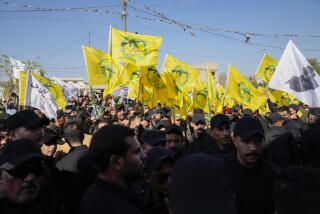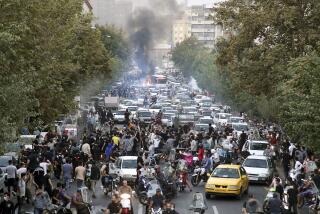Iran-Backed Brigade Starts Buildup in Northern Iraq
- Share via
BANIBEE, Iraq — In a rocky valley along the Sirwan River, a hidden band of guerrillas that could complicate a U.S. invasion of Iraq is digging latrines, pitching tents and preparing for battle beneath red and white flags proclaiming, “There is no God but Allah.”
The fighters belong to the Badr Brigade, an Iranian-backed militia of northern Iraqis vowing to help topple Iraqi President Saddam Hussein and protect Iranian interests along a mountainous border dotted with land mines. The brigade’s 120 tents in this valley are part of a mosaic of militias and armies gathering in northern Iraq, a land of political intrigue governed by ethnic Kurds but continually shadowed by the opposing interests of Turkey and Iran.
As the U.S. prepares for a possible attack against Hussein, Turkey has drafted plans to send tens of thousands of soldiers into northern Iraq if war breaks out. The Badr Brigade, which is seeking to deploy 5,000 fighters, is essentially Iran’s counterweight to Turkish ambitions.
“It’s a dangerous game,” said one Kurdish official familiar with the brigade’s activities.
The Patriotic Union of Kurdistan, which governs the eastern portion of northern Iraq, is split over the wisdom of allowing Badr forces in its territory. Some contend the brigade serves as a military balance to Turkey, the Kurds’ longtime enemy. Others worry that a militia supported by Iran’s Revolutionary Guards may trouble the Bush administration and strain Kurdish-U.S. relations.
State Department spokesman Richard Boucher said recently, “We think any Iranian presence or an Iranian-supported presence in that region is destabilizing and not positive.”
The Badr Brigade is the military wing of the Supreme Council for the Islamic Revolution in Iraq. Founded in 1982 by Mohammed Bakr Hakim and based in Iran, the council is a voice for Iraq’s Shiite Muslims. Iraq’s Shiites, who are concentrated in the south, have been widely persecuted by Hussein’s Sunni-dominated Baath Party. The brigade has 10,000 to 15,000 fighters.
Primarily active along Iran’s border with southern Iraq, the Badr Brigade’s arsenal, according to local intelligence reports, includes antiaircraft guns, 150 tanks, heavy artillery, Katyusha rockets and mortars. The organization is divided into military and intelligence wings run by Iranian and Iraqi commanders. It has had about 250 guerrillas in northern Iraq, also known as Kurdistan, since 2000.
A buildup in Kurdistan would serve a number of political interests. For the Shiite-controlled government of Iran, the brigade would give Tehran a foothold in northern Iraq and help suppress the Moujahedeen Khalq, a radical Islamic group harbored by Baghdad and seeking to overthrow the Iranian government. It would also provide Iran with a proxy military force in Iraq, strengthening the stature of Shiites in any post-Hussein government.
Iran is publicly distancing itself from the Badr Brigade, fearing retaliation by Hussein before a U.S. invasion. “The Iranians are waiting to see which way the wind will blow,” said a Western diplomat in Tehran.
For northern Iraq’s 3.5 million Kurds, the 120 Badr Brigade tents going up along the Sirwan River are visible reminders that their fate may again be tied to their larger neighbors. During the Kurdish civil war of the 1990s, Turkey and Iran played pivotal roles. Turkey was an ally of the Kurdistan Democratic Party in its battles against the Patriotic Union of Kurdistan, which turned to Iran for help.
It is unclear what role, if any, Turkish forces will play if the U.S. goes to war against Iraq. On Saturday, Turkey’s parliament rejected a proposal to permit 62,000 U.S. troops to use Turkey as a staging ground for an invasion into northern Iraq. The measure would have also permitted Turkish troops to enter the country under a U.S. umbrella.
Although some analysts said the defeat of that proposal reduced the chances of Turkish intervention, a strong possibility remains that the Turks may act unilaterally. So some Kurdish officials believe Iran, in the guise of the Badr Brigade, is a worrisome but necessary backstop.
“Our geography is such that we need Iran, so we have to defer to the wishes of Iran,” said the Kurdish official wary of the Badr Brigade’s intentions. “It’s a complex environment. I’m sure the Turks are not happy. This helps them justify their incursion, and that’s what worries me.”
With tents going up behind him and water tanks shining in the sun, Murtaza Musawi, a Badr Brigade security officer, said his unit’s main goal is to overthrow Hussein. Baghdad is 135 miles away. Musawi’s brigade is composed mostly of northern Iraqi Shiites, Kurds and Turkomans who for years have lived in exile in Iran. Some were taken prisoner by Iran during the Iran-Iraq war in the 1980s.
The new camp sprawls across the valley. Its rows of tents can house as many as 1,200 fighters. Some of them are arriving on buses crossing the snow-covered Iranian mountains and traveling 11 miles into Iraq. Work on the camp began about 10 days ago when villagers and shepherds noticed Badr soldiers clearing the land and hauling in equipment, including a loudspeaker, trucks and two field ambulances.
“We will fight,” said Musawi, scratching his well-trimmed silver beard.
Most of the tents around him were empty, and only about 70 fighters were visible, many of them carrying shovels instead of guns, and working to level the ground.
“We are all brothers of one country,” he said, “and we want to get rid of the dictator who has ruined all of our lives.”
*
Fleishman reported from Banibee and Moaveni from Tehran.
More to Read
Sign up for Essential California
The most important California stories and recommendations in your inbox every morning.
You may occasionally receive promotional content from the Los Angeles Times.













